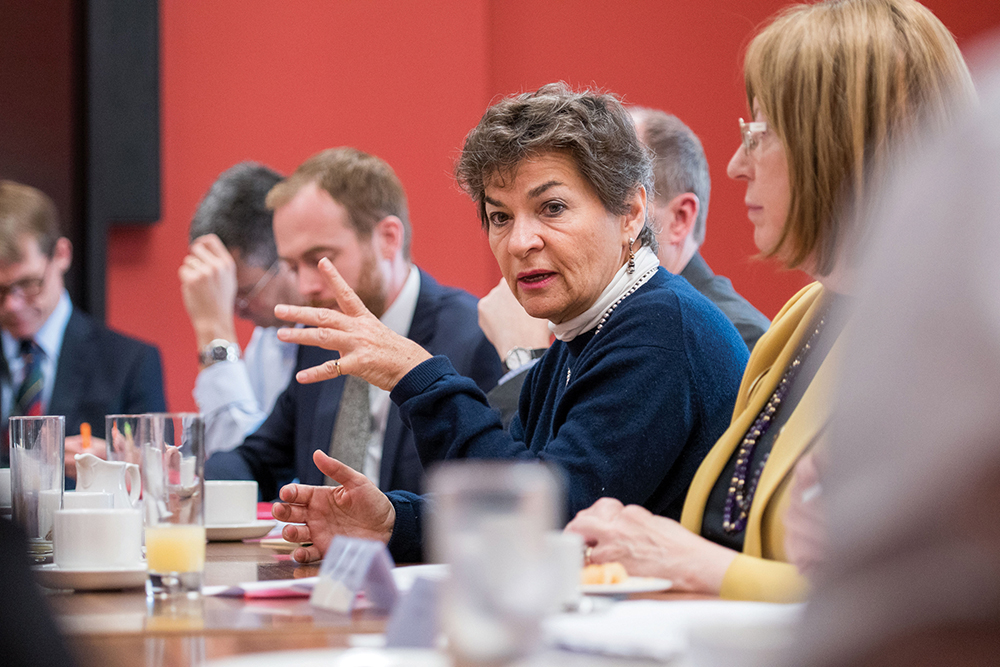
Recovering from the financial crash, political instability, Brexit. Don’t businesses have enough on their plates without having to worry about carbon emissions?
That was just one of the questions raised by Dame Susan Rice, Chair of Scotland’s 2020 Climate Group and Liz McAreavey, CEO, Edinburgh Chamber of Commerce, at a workshop organised by Edinburgh Sustainable Development Partnership, 13 November.
The aim was to provoke a discussion that would engage businesses in Edinburgh’s planning for a sustainable future.
A previous audience at the City Arts Centre had already been ‘provoked’ by Martin Valenti, Vice Chair of Scotland’s 2020 Climate Group.
“Scotland is on track to consume the equivalent of three planets’ worth of natural resources if we continue to use them up at current levels,” he had told them. “Setting ambitious targets to reduce greenhouse gas emissions gives Scotland a unique opportunity to create sustainable economic growth, improve the environment and benefit health.”
Dame Rice and Liz McAreavey delivered a similar ‘downside/upside’ message: You might think climate change sounds alarmist, abstract or expensive but the reality is, decarbonisation is coming, there are simple, practical ways to start the process and you can make it work for your business.
“Businesses are very resilient,” said Liz McAreavey. “Take Brexit. After the initial shock they started to get their heads around it. If we can put climate change in the forefront of their minds, they can handle that, too.”
Dame Rice agreed, adding: “We need to offer examples, role models, partners to small businesses that don’t have a lot of resource.”
Liz McAreavey, Dame Rice and Martin Valenti were among 15 leading figures who met Christiana Figueres, former Executive Secretary of the UN Framework Convention on Climate Change, in October, at a meeting organised by Scotland’s 2020 Climate Group.
Ms Figueres told them straight: addressing climate change is a moral and economic imperative.
“We must ensure global warming stays at 1.5◦C because it’s the only chance to protect the most vulnerable,” she stated. “We need to ensure the economy transitions smoothly to low carbon, with a 6-7% decarbonisation rate every year until 2050, starting in 2020. Is this possible? We think it is.
“It’s amazing what’s happening around the world,” she continued. “Scotland is a global leader in offshore renewables. The UK, France and India are moving to electric cars. Despite the US coming out of the Paris Agreement, cities and companies in America are decarbonising anyway. They can see the benefits to the economy. China, India and the EU are already moving into the vacuum left by Washington.”
The former UN diplomat was clearly inspirational.
“A key message I took away from Christiana Figueres is that every city, every business must find a way to reduce carbon emissions in a way that works economically,” Dame Rice told attendees at November’s workshop. “Don’t separate out the economic imperative of your business from decarbonisation. Decarbonisation is not an add-on. It’s about how you decarbonise in a way that works commercially for your business.”
“Most corporates are starting to get the idea,” added Liz McAreavey. “It’s the smaller businesses who are at risk of being left behind. Those with 1-10 employees are focussed on core activity, understandably. Companies the next size up tend to prioritise talent and scalability. We need to get sustainability in their business strategies.” Lady Rice agreed. “Learning from others can help.”





